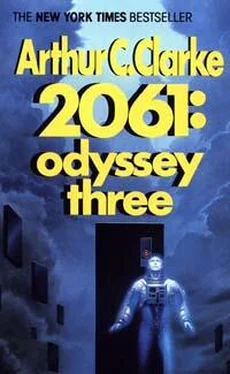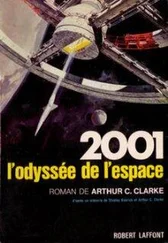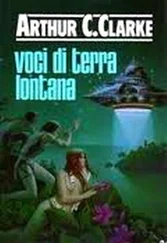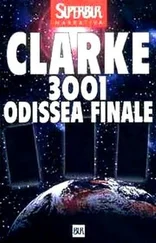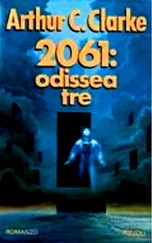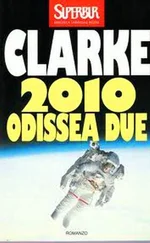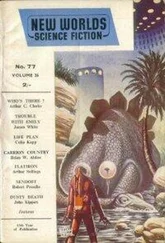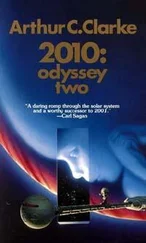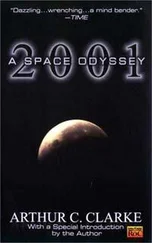Arthur Clarke - 2061 - Odyssey Three
Здесь есть возможность читать онлайн «Arthur Clarke - 2061 - Odyssey Three» весь текст электронной книги совершенно бесплатно (целиком полную версию без сокращений). В некоторых случаях можно слушать аудио, скачать через торрент в формате fb2 и присутствует краткое содержание. Жанр: Фантастика и фэнтези, на английском языке. Описание произведения, (предисловие) а так же отзывы посетителей доступны на портале библиотеки ЛибКат.
- Название:2061: Odyssey Three
- Автор:
- Жанр:
- Год:неизвестен
- ISBN:нет данных
- Рейтинг книги:3 / 5. Голосов: 1
-
Избранное:Добавить в избранное
- Отзывы:
-
Ваша оценка:
- 60
- 1
- 2
- 3
- 4
- 5
2061: Odyssey Three: краткое содержание, описание и аннотация
Предлагаем к чтению аннотацию, описание, краткое содержание или предисловие (зависит от того, что написал сам автор книги «2061: Odyssey Three»). Если вы не нашли необходимую информацию о книге — напишите в комментариях, мы постараемся отыскать её.
2061: Odyssey Three — читать онлайн бесплатно полную книгу (весь текст) целиком
Ниже представлен текст книги, разбитый по страницам. Система сохранения места последней прочитанной страницы, позволяет с удобством читать онлайн бесплатно книгу «2061: Odyssey Three», без необходимости каждый раз заново искать на чём Вы остановились. Поставьте закладку, и сможете в любой момент перейти на страницу, на которой закончили чтение.
Интервал:
Закладка:
As the senior passenger – by almost any reckoning – he had been given the privilege of making the first EVA. And he really had no choice of companion.
'EVA with Yva!' chortled Mihailovich. 'How can you possibly resist! Even if,' he added with a lewd grin, 'those damn suits won't let you try all the Extravehicular Activities you'd like,'
Yva had agreed, without any hesitation, yet also without any enthusiasm. That, Floyd thought wryly, was typical. It would not be quite true to say that he was disillusioned – at his age, he had very few illusions left – but he was disappointed. And with himself rather than Yva; she was as beyond criticism or praise as the Mona Lisa – with whom she had often been compared.
The comparison was, of course, ridiculous; La Gioconda was mysterious, but she was certainly not erotic. Yva's power had lain in her unique combination of both – with innocence thrown in for good measure. Half a century later, traces of all three ingredients were still visible, at least to the eye of faith.
What was lacking – as Floyd had been sadly forced to admit – was any real personality. When he tried to focus his mind upon her, all he could visualize were the roles she had played. He would have reluctantly agreed with the critic who had once said:
'Yva Merlin is the reflection of all men's desires; but a mirror has no character.'
And now this unique and mysterious creature was floating beside him across the face of Halley's Comet, as they and their guide moved along the twin cables that spanned the Valley of Black Snow. That was his name; he was childishly proud of it, even though it would never appear on any map. There could be no maps of a world where geography was as ephemeral as weather on Earth. He savoured the knowledge that no human eye had ever before looked upon the scene around him – or ever would again.
On Mars, or on the Moon, you could sometimes -with a slight effort of imagination, and if you ignored the alien sky – pretend that you were on Earth. This was impossible here, because the towering – often overhanging – snow sculptures showed only the slightest concession to gravity. You had to look very carefully at your surroundings to decide which way was up.
The Valley of Black Snow was unusual, because it was a fairly solid structure – a rocky reef embedded in volatile drifts of water and hydrocarbon ice. The geologists were still arguing about its origin, some maintaining that it was really part of an asteroid that had encountered the comet ages ago. Corings had revealed complex mixtures of organic compounds, rather like frozen coal-tar – though it was certain that life had never played any part in their formation.
The 'snow' carpeting of the floor of the little valley was not completely black; when Floyd raked it with the beam of his flashlight it glittered and sparkled as if embedded with a million microscopic diamonds. He wondered if there were indeed diamonds on Halley: there was certainly enough carbon here. But it was almost equally certain that the temperatures and pressures necessary to create them had never existed here.
On a sudden impulse, Floyd reached down and gathered two handfuls of the snow: he had to push with his feet against the safety line to do so, and had a comic vision of himself as a trapeze artist walking a tightrope – but upside down. The fragile crust offered virtually no resistance as he buried head and shoulders into it; then he pulled gently on his tether and emerged with his handful of Halley.
He wished that he could feel it through the insulation of his gloves, as he compacted the mass of crystalline fluff into a ball that just fitted the palm of his hand. There it lay, ebony black yet giving fugitive flashes of light as he turned it from side to side.
And suddenly, in his imagination, it became the purest white – and he was a boy again, in the winter playground of his youth, surrounded with the ghosts of his childhood. He could even hear the cries of his companions, taunting and threatening him with their own projectiles of immaculate snow...
The memory was brief, but shattering, for it brought an overwhelming sensation of sadness. Across a century of time, he could no longer remember a single one of those phantom friends who stood around him; yet some, he knew, he had once loved...
His eyes filled with tears, and his fingers clenched around the ball of alien snow. Then the vision faded; he was himself again. This was not a moment of sadness, but of triumph.
'My God!' cried Heywood Floyd, his words echoing in the tiny, reverberant universe of his spacesuit, 'I'm standing on Halley's Comet – what more do I want! If a meteor hits me now, I won't have a single complaint!'
He brought up his arms and launched the snowball towards the stars. It was so small, and so dark, that it vanished almost at once, but he kept on staring into the sky.
And then, abruptly – unexpectedly – it appeared in a sudden explosion of light, as it rose into the rays of the hidden Sun. Black as soot though it was, it reflected enough of that blinding brilliance to be easily visible against the faintly luminous sky.
Floyd watched it until it finally disappeared – perhaps by evaporation, perhaps by dwindling into the distance. It would not last long in the fierce torrent of radiation overhead; but how many men could claim to have created a comet of their own?
18 – 'Old Faithful'
The cautious exploration of the comet had already begun while Universe still remained in the polar shadow. First, one-man EMUs (few people now knew that stood for External Manoeuvring Unit) gently jetted over both day– and nightside, recording everything of interest. Once the preliminary surveys had been completed, groups of up to five scientists flew out in the onboard shuttle, deploying equipment and instruments at strategic spots.
The Lady Jasmine was a far cry from the primitive 'space pods' of the Discovery era, capable of operating only in a gravity-free environment. She was virtually a small spaceship, designed to ferry personnel and light cargo between the orbiting Universe and the surfaces of Mars, Moon, or the Jovian satellites. Her chief pilot, who treated her like the grande dame she was, complained with mock bitterness that flying round a miserable little comet was far beneath her dignity.
When he was quite sure that Halley – on the surface at least – held no surprises, Captain Smith lifted away from the pole. Moving less than a dozen kilometres took Universe to a different world, from a glimmering twilight that would last for months to a realm that knew the cycle of night and day. And with the dawn, the comet came slowly to life.
As the Sun crept above the jagged, absurdly close horizon, its rays would slant down into the countless small craters that pockmarked the crust. Most of them would remain inactive, their narrow throats sealed by incrustations of mineral salts. Nowhere else on Halley were such vivid displays of colour; they had misled biologists into thinking that here life was beginning, as it had on Earth, in the form of algal growths. Many had not yet abandoned that hope, though they would be reluctant to admit it.
From other craters, wisps of vapour floated up into the sky, moving in unnaturally straight trajectories because there were no winds to divert them. Usually nothing else happened for an hour or two; then, as the Sun's warmth penetrated to the frozen interior, Halley would begin to spurt – as Victor Willis had put it 'like a pod of whales'.
Though picturesque, it was not one of his more accurate metaphors. The jets from the dayside of Halley were not intermittent, but played steadily for hours at a time. And they did not curl over and fall back to the surface, but went rising on up into the sky, until they were lost in the glowing fog which they helped create.
Читать дальшеИнтервал:
Закладка:
Похожие книги на «2061: Odyssey Three»
Представляем Вашему вниманию похожие книги на «2061: Odyssey Three» списком для выбора. Мы отобрали схожую по названию и смыслу литературу в надежде предоставить читателям больше вариантов отыскать новые, интересные, ещё непрочитанные произведения.
Обсуждение, отзывы о книге «2061: Odyssey Three» и просто собственные мнения читателей. Оставьте ваши комментарии, напишите, что Вы думаете о произведении, его смысле или главных героях. Укажите что конкретно понравилось, а что нет, и почему Вы так считаете.
